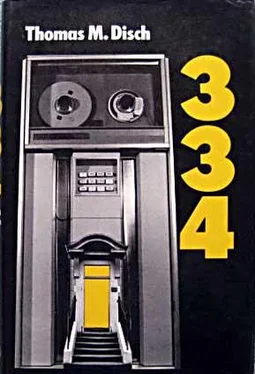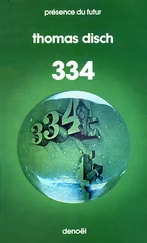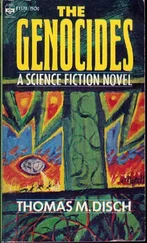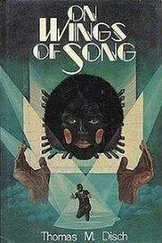In the ward the doctors had moved on to Unit 6 and were listening with tolerant smiles to Mrs. Harrison’s jokes about her colostomy.
The new Ford commercial came on, like an old friend calling Chapel by name. A girl in an Empire coupe drove through endless fields of grain. Ab had said, who said so many things just for their shock value, that the commercials were often better than the programs.
At last they trooped off together to the men’s ward, leaving the curtains drawn around Unit 7. Frances Schaap was asleep. The little red light on the machine winked on and off, on and off, like a jet flying over the city at night.
Using the diagram Ab had scrawled on the back of a transfer form, Chapel found the pressure adjustment for the portal vein. He turned it left till it stopped. The arrow on the scale below, marked P P, moved slowly from 35, to 40, to 50. To 60.
To 65.
He turned the dial back to where it had been. The arrow shivered: the portal vein had hemorrhaged.
Frances Schaap woke up. She lifted one thin, astonished hand toward her lips: they were smiling! “Doctor,” she said pleasantly. “Oh, I feel…” The hand fell back to the sheet.
Chapel looked away from her eyes. He readjusted the dial, which was no different, essentially, from the controls of his own Yamaha. The arrow moved right, along the scale: 50. 55.
“… so much better now.”
60. 65.
“Thanks.”
70.
“I hope, Mr. Holt, that you won’t let me keep you from your work,” Joel Beck said, with candid insincerity. “I fear I have already.”
Ab thought twice before agreeing to this. At first he’d been convinced she was actually an investigator Macy’s had hired to nail him, but her story about the computer checking out the obits and sending her here was not the sort of thing anyone could have made up. It was bad enough, her being from the Times, and worse perhaps.
“Am I?” she insisted.
If he said yes, he had work to do, she’d ask to tag along and watch. If he said no, then she’d go on with her damned questions. If it hadn’t been that she’d have reported him (he could recognize the type), he’d have told her to fuck off.
“Oh, I don’t know,” he answered carefully. “Isn’t it me who’s keeping you from your work?”
“How so?”
“Like I explained, there’s a woman up on 18 who’s sure to terminate any minute now. I’m just waiting for them to call.”
“Half an hour ago you said it wouldn’t take fifteen minutes, and you’re still waiting. Possibly the doctors have pulled her through. Wouldn’t that be wonderful?”
“Someone is bound to die by twelve o’clock.”
“By the same logic someone was bound to have died by now—and they haven’t.”
Ab could not support the strain of diplomacy any longer. “Look, lady, you’re wasting your time—it’s as simple as that.”
“It won’t be the first time,” Joel Beck replied complacently. “You might almost say that that’s what I’m paid to do.” She unslung her recorder. “If you’d just answer one or two more questions, give me a few more details of what you actually do, possibly we’ll come up with a handle for a more general story. Then even if that call does come I could go up with you and look over your shoulder.”
“Who would be interested?” With growing astonishment Ab realized that she did not so much resist his arguments as simply ignore them.
While Joel Beck was explaining the intrinsic fascination of death to the readers of the Times (not a morbid fascination but the universal human response to a universal human fact), the call came from Chapel.
He had done what Ab asked him to.
“Yeah, and?”
It had gone off okay.
“Is it official yet?”
It wasn’t. There was no one in the ward.
“Couldn’t you, uh, mention the matter to someone who can make it official?”
The Times woman was poking about the morgue, fingering things, pretending not to eavesdrop. Ab felt she could decipher his generalities. His first confession had been the same kind of nightmare, with Ab certain all his classmates lined up outside the confessional had overheard the sins the priest had pried out of him. If she hadn’t been listening he could have tried to bully Chapel into…
He’d hung up. It was just as well.
“Was that the call?” she asked.
“No. Something else, a private matter.”
So she kept at him with more questions about the ovens, and whether relatives ever came in to watch, and how long it took, until the desk called to say there was a driver from Macy’s trying to bring a body into the hospital and should they let him?
“Hold him right there. I’m on my way.”
“That was the call,” Joel Beck said, genuinely disappointed.
“Mm. I’ll be right back.”
The driver, flustered, started in with some story why he was late.
“It’s skin off your ass, not mine. Never mind that anyhow. There’s a reporter in my office from the Times— ”
“I knew,” the driver said. “It’s not enough I’m going to be fired, now you’ve found a way—”
“Listen to me, asshole. This isn’t about the Newman fuckup. And if you don’t panic she never has to know.” He explained about the city desk computer. “So we just won’t let her get any strange ideas, right? Like she might if she saw you hauling one corpse into the morgue and going off with another.”
“Yeah, but…” The driver clutched for his purpose as for a hat that a great wind were lifting from his head. “But they’ll crucify me at Macy’s if I don’t come back with the Newman body! I’m so late already because of the damned—”
“You’ll get the body. You’ll take back both. You can return with the other one later, but the important thing now—”
He felt her hand on his shoulder, bland as a smile.
“I thought you couldn’t have gone too far away. There’s a call for you and I’m afraid you were right: Miss Schaap has died. That is whom you were speaking of?”
Whom! Ab thought with a sudden passion of hatred for the Times and its band of pseudo-intellectuals. Whom!
The Macy’s driver was disappearing toward his cart.
It came to Ab then, the plan of his salvation, whole and entire, the way a masterpiece must come to a great artist, its edges glowing.
“Bob!” Ab called out. “Wait a minute.”
The driver turned halfway round, head bent sideways, an eyebrow raised: who, me?
“Bob, I want you to meet, uh … ”
“Joel Beck.”
“Right. Joel, this is Bob, uh, Bob Newman.” It was, in fact, Samuel Blake. Ab was bad at remembering names.
Samuel Blake and Joel Beck shook hands.
“Bob drives for Macy’s Clinic, the Steven Jay Mandell Memorial Clinic.” he laid one hand on Blake’s shoulder, the other hand on Beck’s. She seemed to become aware of his stump for the first time and flinched. “Do you know anything about cryonics, Miss uh?”
“Beck. No, very little.”
“Mandell was the very first New Yorker to go to the freezers. Bob could tell you all about him, a fantastic story.” He steered them back down the corridor toward the morgue.
“Bob is here right now because of the body they just… Uh.” He remembered too late that you didn’t call them bodies in front of outsiders. “Because of Miss Schaap, that is. Whom,” he added with malicious emphasis, “was insured with Bob’s clinic.” Ab squeezed the driver’s shoulder in lieu of winking.
“Whenever possible, you see, we notify the clinic people, so that they can be here the minute one of their clients terminates. That way there’s not a minute lost. Right, Bob?”
The driver nodded, thinking his way slowly toward the idea Ab had prepared for him. He opened the door to his office, waited for them to go in. “So while I’m upstairs why don’t you and Bob have a talk, Miss Peck. Bob has dozens of incredible stories he can tell you, but you’ll have to be quick. Cause once I’ve got his body down here …” Ab gave the driver a significant look. “… Bob will have to leave.”
Читать дальше












